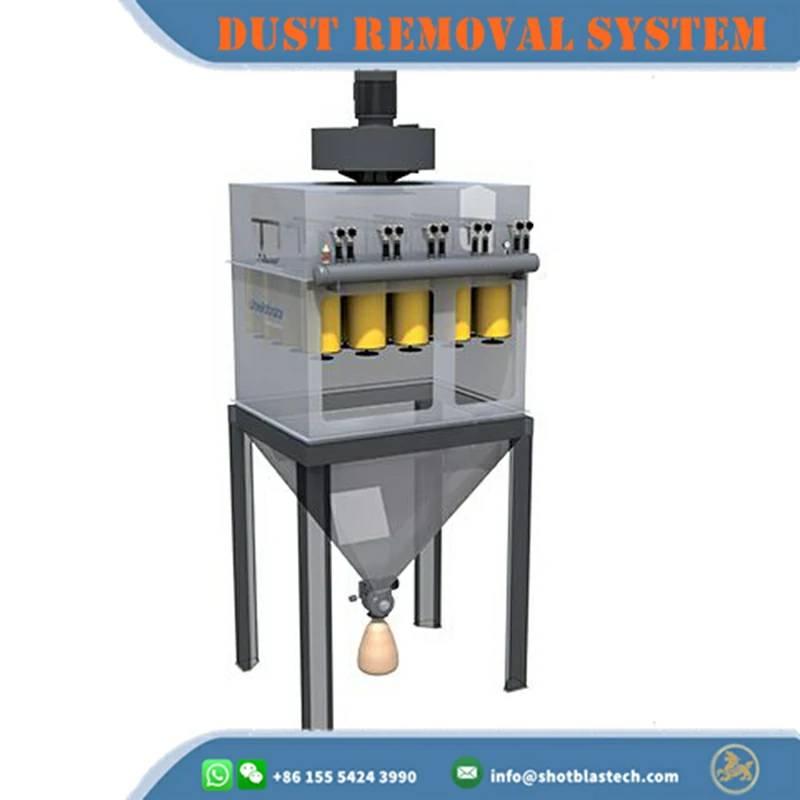Introduction to the Dust Removal System
The dust removal system comprises dust collecting and dust exhausting ducts, dust suction inlets located at the bottom and sides, modular filter cartridge dust collector, dust exhausting fans, dust exhausting chimneys, and additional components.
The main function of the dust removal system:
A dust collector in a shot blasting machine captures and removes dust and debris generated during the process. Shot blasting machines propel abrasives to clean or finish surfaces, creating hazardous airborne particles. The dust collector creates suction or airflow, using a filtration system with cartridges or bags to capture particles while allowing clean air to pass through. This ensures a clean and safe working environment by reducing airborne dust, improving visibility, and minimizing respiratory risks for operators. It also prevents environmental pollution by containing dust dispersion. Additional features like dust removal mechanisms, monitoring systems, and controls optimize performance. Overall, the dust collector is essential for a clean, healthy workplace and enhances the efficiency of shot blasting operations.

The main type of the dust eliminate system for the shot blasting machine and sand blasting room:
1. The cyclone filter dust collectors:
The cyclone dust collector requires minimal maintenance and has no moving parts or ring-shaped filters. It utilizes centrifugal force to efficiently separate dust particles from the air. Available in single-cylinder and multi-cylinder versions, the latter combines multiple units to double processing capacity. While the cyclone dust collector has an overall dust removal efficiency of over 80%, it struggles with fine particle separation and isn’t widely used in sandblasting. However, in well-ventilated sandblasting rooms with few surface impurities and high-quality abrasives, it can meet environmental requirements. The cyclone dust collector offers unique advantages compared to other models. Its efficiency is influenced by the wind speed at the inlet, with recommended speeds ranging between 18-22m/s.
2. The bags filter dust collecting system:
The bag dust collectors, utilizing fiber fabric as its filter material, holds the distinction of being the earliest dust collector of its kind. With a history spanning decades, it boasts a high dust removal efficiency, exceeding 99%. It effectively separates fine particles of dust, making it a crucial component in air purification and environmental protection. In the blast cleaning industry, the bag dust collector serves as the primary device for purifying dust-laden air, meeting ventilation and dust removal requirements. Specifically, in sandblasting and shot blasting procedures, the box-type bag dust collector fulfills the air quality needs of most blasting rooms, making it the preferred choice for ventilation and dust removal in such environments.
3. The cartridges filter dust collectors:
The cartridge filter dust collector is a type of dust collector that employs cartridge filters as its primary filtration mechanism. It consists of a housing containing multiple cartridge filters, which capture and remove dust particles from the air. These filters are typically made of pleated fabric or paper, providing a large surface area for efficient filtration. The cartridge filter dust collector offers high dust removal efficiency, often exceeding 99%. It is commonly used in various industries, including woodworking, metalworking, and pharmaceuticals. The compact design and easy maintenance of cartridge filters make this dust collector popular, as they can be easily replaced or cleaned when necessary to ensure optimal performance.
Key Features of the Dust removal system:
- The dust collector incorporates an advanced sinking flow layout and a vertical structure of filter tubes, ensuring effective and synchronized dust removal during operation.
- It features a specialized pulse controller that enables automatic dedusting without the need for manual intervention, offering a high degree of automation.
- The filter cartridges are vertically installed, allowing for convenient removal and replacement. In the case of general dust, the filter cartridges can be used for an extended period without replacement, resulting in significant maintenance cost savings.
- Equipped with a dedusting fan, the system filters the dust-laden airflow through a primary cyclone separator and further purifies it using the filter cartridge. This effectively prevents environmental pollution and ensures the well-being of operators by meeting air emission limits for pollutants.
Upgrade functions of the dust collect system:
– Noise reduction is achieved by implementing noise isolation around valves, fan silencer mounted at the fan exit resulting in a decrease of approximately 2-3 dBa.
– The dust collector’s doubled filtering surface effectively reduces dust at the outlet, with a maximum dust content of no more than 10 mg/m3.
– A secondary dust collectors, mounted at the fan exit, ensures a minimum of 95% efficiency according to EN1882 standards.
– A dust gauge at the outlet detects particles larger than 0.3 µm, providing warnings when values exceed rated levels.
– The differential pressure gauge automatically regulates the blowing-out of dust collector cartridges based on saturation, issuing warnings when cartridge replacement is necessary.
– An air flow gauge maintains a constant airflow throughout the system.
– The dust collector fan’s frequency converter allows for fast and significant energy consumption reduction.